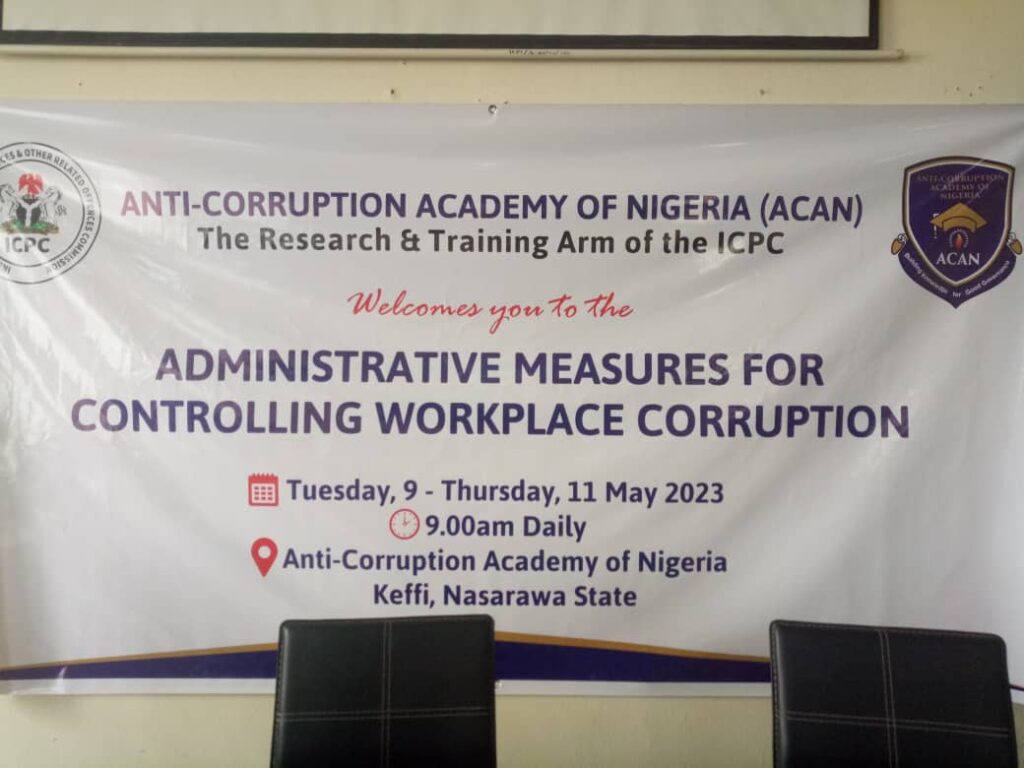Corruption in Nigeria, a major setback – Provost, Anti-Corruption Academy of Nigeria
From left: Head of Programmes, ACAN, Richard Bello, representative of Provost, ACAN, Registrar of the Academy, Samuel Lodam and Acting Director (Administration), Bello Dauda Onimisi at the opening of the workshop
By Anthony Maliki, Samuel Torlumun, Keffi
The Provost, Anti-Corruption Academy of Nigeria (ACAN), Keffi in Nasarawa State, Professor Olatunde Babawale has expressed concern that corruption is, arguably, a major challenge to Nigeria and one of the many reasons for its setback as a people over the years.
He made the remarks on Tuesday at the Academy during the opening of a three-day workshop on “Administrative measures for controlling workplace corruption” for personnel of Ministries, Departments and Agencies (MDAs).
The Provost, who was represented by the Registrar and Head of Administration of ACAN, Samuel Lodam pointed out that “it is more disheartening that despite efforts by successful governments, this monster continues to bite harder into the fabrics of the nation.”
While describing corruption as a crime and should be treated as one, concerted efforts are needed to fight the social menace from all fronts, he said, it is also imperative to look inward and take advantage of administrative provision in Ministries, Department and Agencies, (MDAs) to ameliorate opportunities to perpetrate this dastardly act and where applicable, enforce sanction to the later.
According to the Provost, the essence of the workshop is to examine the various administrative measures at the disposal of MDAs and utilize same in controlling corruption in workplaces.

Professor Babawale noted that in this regard, bureaucratic corruption has remained a challenge to Nigeria’s anti-corruption efforts shall be exposed.
Besides, he said, social norms, behavioural change and the expectations that encourage corruption in workplace will also be on the table.
“How to deplore SERVICOM, information, education and communication resources as well as meetings and minutes as strategic administrative tools for controlling workplace corruption will also be in discourse. This workshop resonates with ACAN philosophy that corruption and related crimes can be manage and controlled through a system of training and retraining that will produce sound anti-corruption policy operations, efficiency and good management structure,” he explained.
In a presentation on “Bureaucratic corruption- A challenge to Nigeria’s anti-corruption efforts”, the Acting Director (Administration), Independent Corrupt Practices and Other Related Offences Commission (ICPC), Bello Dauda Onimisi, noted that corruption is not only in monetary terms but also attitude, behaviour, disobeying rules and regulations and greed among others.
According to him, the performance of public bureaucracy has always come under severe criticisms because of the gap that exists between its anticipated role and actual output.
While explaining that it is not policy that is the problem in Nigeria but implementation pointed out that corruption has been the bane of Nigerian public administration since the attainment of independence in 1960.
Onimisi stressed that as a way forward to mitigate corruption, certain things should be considered. They include full attainment of financial reforms, improved reward system for honest behaviour, improved renumeration for public servants, improved social welfare scheme especially pensions, more adherence to transparency and accountability and enforcement among others.
Among presentations expected at the workshop include: “Administrative procedures for controlling workplace corruption”, “Deploying SERVICOM as an effective anti-corruption mechanism”, and “Entrenching ethics and integrity in the administrative processes and procedures of MDAs” among others.


